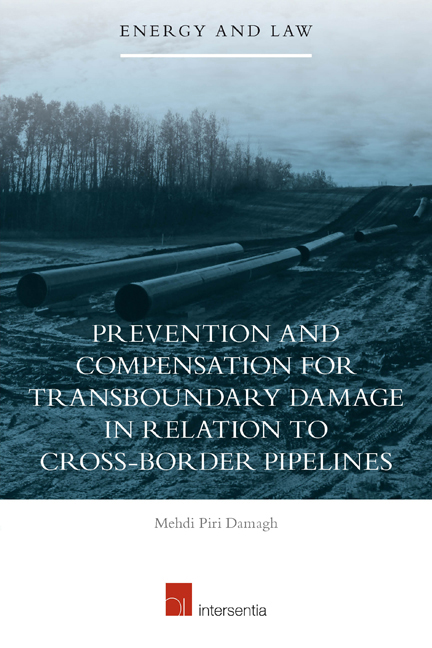Book contents
- Frontmatter
- Dedication
- Acknowledgements
- Contents
- Abbreviations
- List of Tables and Maps
- Chapter 1 Introduction
- PART I INTRODUCTORY ISSUES: PIPELINES, THE NATURE OF RISKS ASSOCIATED WITH PIPELINES AND THEIR REGULATORY REGIMES
- PART II PREVENTION OF CROSS-BORDER PIPELINE ACCIDENTS – MEANS AND SOURCES
- PART III STATE RESPONSIBILITY FOR TRANS-BOUNDARY DAMAGE CAUSED BY PIPELINES
- Introductory Note
- Chapter 8 The Origin of State Responsibility
- Chapter 9 Responsibility of States to Ensure Adequate Compensation for Transboundary Damage Caused by Oil and Gas Pipelines Laid under Their Jurisdiction and Control
- Chapter 10 Responsibility of States for Trans-boundary Damage Caused by the Prohibited Operation of Oil and Gas Pipelines
- Chapter 11 Conclusion and Policy Recommendations
- Summary
- Bibliography
- Valorisation Addendum
- Curriculum Vitae
Introductory Note
from PART III - STATE RESPONSIBILITY FOR TRANS-BOUNDARY DAMAGE CAUSED BY PIPELINES
Published online by Cambridge University Press: 13 December 2017
- Frontmatter
- Dedication
- Acknowledgements
- Contents
- Abbreviations
- List of Tables and Maps
- Chapter 1 Introduction
- PART I INTRODUCTORY ISSUES: PIPELINES, THE NATURE OF RISKS ASSOCIATED WITH PIPELINES AND THEIR REGULATORY REGIMES
- PART II PREVENTION OF CROSS-BORDER PIPELINE ACCIDENTS – MEANS AND SOURCES
- PART III STATE RESPONSIBILITY FOR TRANS-BOUNDARY DAMAGE CAUSED BY PIPELINES
- Introductory Note
- Chapter 8 The Origin of State Responsibility
- Chapter 9 Responsibility of States to Ensure Adequate Compensation for Transboundary Damage Caused by Oil and Gas Pipelines Laid under Their Jurisdiction and Control
- Chapter 10 Responsibility of States for Trans-boundary Damage Caused by the Prohibited Operation of Oil and Gas Pipelines
- Chapter 11 Conclusion and Policy Recommendations
- Summary
- Bibliography
- Valorisation Addendum
- Curriculum Vitae
Summary
The transportation of oil and gas via pipelines creates safety and environmental risks. The cross-border pipelines as stretched across international borders are mainly regulated by bilateral or multilateral agreements. They may pose risks of trans-boundary damage to the states involved in the pipeline project as well as to neighbouring states. Previously it was argued that cross-border pipelines are created by bilateral and multilateral agreements. Therefore the main source of the safety and environmental regulations can be found in the pipeline agreements. On the other hand, there are international and regional conventions which partly deal with the construction and operation of the cross-border pipelines. The prevention of trans-boundary damage in the case of oil and gas pipelines is mainly done via imposing safety and environmental regulations. It is further discussed that bilateral and multilateral agreements which are signed by the states involved mainly include the authorization, operational and commercial matters. The contracting parties to such agreements are thus obliged to cooperate with the others in the formulation and establishment of technical, safety and environmental standards for the project consistent with the requirements as set forth in the relevant Host Government Agreement. Therefore the first group of state obligations to prevent trans-boundary damage can be found in the cross-border pipeline agreements.
Although there is no comprehensive convention specifically dealing with the safety and environmental aspects of the cross-border pipeline, there are a few regional and international conventions which contain provisions in relation to the prevention of the trans-boundary damage. In general it was mentioned that the UNCLOS Convention, the ECT, the Espoo Convention, the UNECE water Convention and the International Watercourse Convention include provisions concerning the construction and operation of oil and gas pipelines. It was further mentioned that these international and regional instruments impose at least two obligations on the contracting parties with respect to the prevention or reduction of trans-boundary damage, albeit to varying degrees. Moreover, it was noted that customary international law imposes duties to prevent trans-boundary environmental damage and to co-operate with all states concerned.
Meanwhile, it was shown in Chapter 7 that the current safety and environmental regulations governing oil and gas pipelines are less likely to be fully effective to prevent trans-boundary damage.
- Type
- Chapter
- Information
- Prevention and Compensation for Transboundary Damage in Relation to Cross-border Oil and Gas Pipelines , pp. 313 - 318Publisher: IntersentiaPrint publication year: 2015



